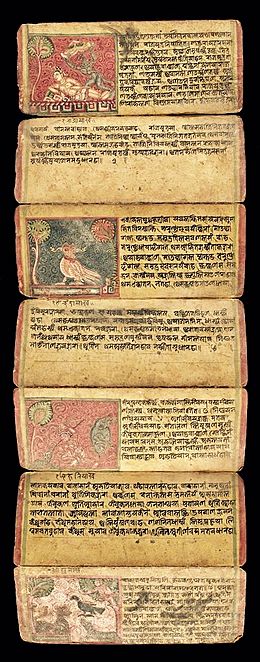Hitopadesha facts for kids
The Hitopadesa is a very old collection of short stories. It was first written in Sanskrit, an ancient language of India. This book is quite similar to another famous Sanskrit story collection called the Panchatantra. The Hitopadesa is full of fables, which are stories that teach a lesson. These fables often feature both animal and human characters.

Contents
What is the Hitopadesa?
The Hitopadesa is a book of short, simple stories. Many of these stories are fables. Fables are special tales where animals often talk and act like people. Each story usually teaches an important lesson about life or good behavior.
Stories and Lessons
The stories in Hitopadesa are designed to teach young princes about politics, good manners, and how to make wise decisions. They cover topics like friendship, honesty, courage, and how to deal with tricky situations. The characters, whether animals or humans, face problems and learn from their experiences.
Why Fables?
Using animals in fables makes the lessons easier to understand and remember. It also allows the stories to talk about complex ideas in a fun way. For example, a clever fox might teach about being smart, or a strong lion might show the importance of leadership.
A Look at Its History
The Hitopadesa was written many centuries ago. We do not know the exact author. However, it is believed that a scholar named Narayana compiled these stories. He gathered them from older texts and added some of his own.
How Old Is It?
Experts believe the Hitopadesa was put together sometime between the 8th and 14th centuries CE. This makes it a very old and important work of Indian literature. It shows how people thought and what they valued a long time ago.
Spreading Around the World
Over time, the stories from Hitopadesa became very popular. They spread from India to many other parts of the world. People loved the lessons and the clever ways the stories were told.
Translations
Because of its popularity, the Hitopadesa has been translated into most of the major languages of the world. One of the first English translations was done by Sir Edwin Arnold. He was a principal at a college in Pune, India. His translation was published in London in 1861. This helped introduce the Hitopadesa to many English speakers.
See also
 In Spanish: Jitopadesa para niños
In Spanish: Jitopadesa para niños
 | James Van Der Zee |
 | Alma Thomas |
 | Ellis Wilson |
 | Margaret Taylor-Burroughs |

